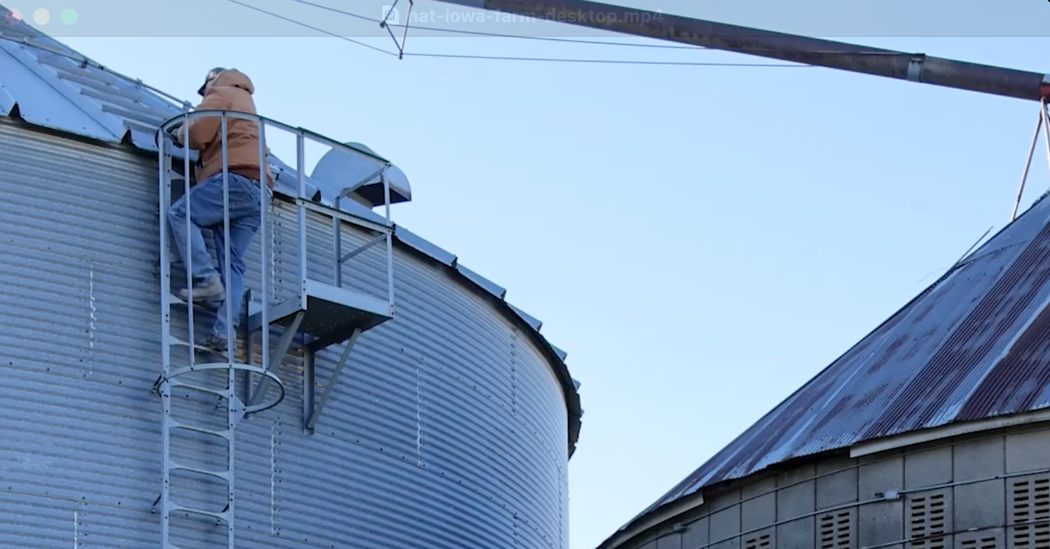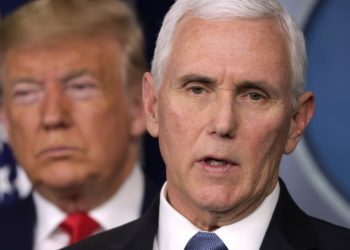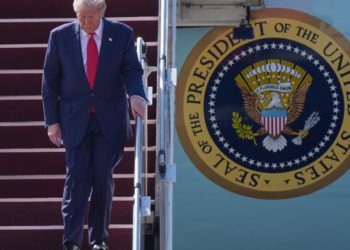When President Trump announced a $20 billion bailout for Argentina this month, Larry Ory, 86, a farmer in Earlham, Iowa, could hardly believe it, especially after boatloads of Argentine soybeans began shipping to China, a once-critical customer for Mr. Ory’s family.
For Iowans, losing China’s soybean market in the president’s trade war was only one of many economic shocks that have hit the state since the start of Mr. Trump’s second term. The cost of tractors and fertilizers have shot up with his tariffs. Labor has grown scarcer in agribusinesses. Major manufacturers have laid off workers. Even the ubiquitous wind turbines that provide income for some Iowa farmers are in the president’s sights.
“Right now, we’re fighting different economic wars all at once,” said Summer Ory, 37, the wife of Mr. Ory’s grandson, Dan. The couple works in the family’s farm business. “You can sustain it one at a time, but right now it’s death by a thousand paper cuts.”
Ms. Ory said she votes in every election, but she, like Mr. Ory, declined to say who she cast her ballot for last November.
Since siding with Barack Obama twice, Iowa has become a stronghold for Mr. Trump. Yet perhaps no state has struggled more with his economic policies. During the first quarter of 2025, Iowa’s gross domestic product dropped by 6.1 percent, more than any other state aside from neighboring Nebraska.
Manufacturing, which drives 17 percent of Iowa’s economic output, has been hit with higher production costs in part because of steep tariffs on inputs like aluminum and steel. Meatpacking plants, which help make Iowa the nation’s leading pork producer, rely heavily on foreign-born workers, hundreds of thousands of whom saw their legal status stripped away by the president. Mr. Trump’s war on renewable energy also threatens the wind industry that produces more than half of Iowa’s electricity.
Some of the state’s troubles, like bad weather, high interest rates, an aging and shrinking rural population, and global commodity prices, are beyond the president’s control. But new economic policies have magnified the state’s woes, according to economists, agricultural groups and some business leaders.
“This is as challenging as I’ve seen it,” Kirk Leeds, the chief executive of the Iowa Soybean Association, said. “We’ve got uncertainties beyond compare.”
Next year’s midterm elections could indicate how Iowans feel about those policies. At least two competitive House districts will be up for a vote. The state will also choose a replacement for its retiring governor, Kim Reynolds, and a retiring senator, Joni Ernst. All those posts are held by Republicans.
“People are hurting everywhere in Iowa, and they’re looking for something different,” said Josh Turek, a Democratic state house member running for Ms. Ernst’s seat.
Mr. Trump has argued the tariffs will help protect American jobs and rectify trade imbalances, while enforcing immigration laws will free up work for citizens.
“There is no shortage of American minds and hands to grow our labor force,” Abigail Jackson, a White House spokeswoman, said, adding that the president was “capitalizing on that untapped potential while delivering on our mandate to enforce our immigration laws.”
And many Iowans remain loyal. Doug Keller, 63, who farms about 15 miles southwest of Waterloo, said he was hopeful the president will reach a new trade deal with China that will benefit farmers in the long run. Matt Wyatt, 51, who also voted for Mr. Trump, agreed.
“Money is tighter than it should be,” said Mr. Wyatt, who works with Mr. Keller to grow corn and soybeans on close to 1,500 acres of land. “But we try to stay optimistic around here.”
For now, times are tough. Iowa is the country’s second-largest producer of both corn and soybeans. America exports as much as half its soybeans, and the vast majority of that had gone to China — $12.6 billion worth last year.
But this year, China stopped purchasing soybeans from the United States to retaliate against Mr. Trump’s tariffs. American producers have spent decades working with people in China on how to use soy in animal feed, part of an effort to build up that growing market. Mr. Leeds said he has traveled to the country 25 times and used dollars paid by Iowa farmers to foster strong bonds with Chinese importers.
“I’m not exactly sure how we repair some of these relationships,” Mr. Leeds said.
The president’s bailout of his ally, President Javier Milei of Argentina, has rankled many Iowans, since China moved immediately after it was announced to lock up Argentine soybean exports to fill the gap from Beijing’s boycott of American soy.
“Who are you subsidizing, our competitors or us?” Larry Ory asked.
Iowa’s large beef industry then recoiled after Mr. Trump suggested he would try to lower the cost of beef by importing more from Argentina. Bryan Whaley, the chief executive of the Iowa Cattlemen’s Association, said Mr. Trump’s comments roiled cattle markets, and a volatile market “provides less of an opportunity for our producers — cattlemen and women here in Iowa — to make decisions that are going to help keep them profitable and viable.”
The president said he will take some money raised by his tariffs and “give it to farmers” as a bailout, but that is not necessarily welcome news.
“We would much rather farm with no federal assistance whatsoever,” Mr. Wyatt said. “We want to be able to sell our products for a good value, and normally we can.”
John Gilbert, a farmer in Iowa Falls, said he expected the government payments to favor larger agribusinesses and to drive more consolidation in an industry that has been dominated by big corporations.
“The payments are skewed to the bigger guys,” said Mr. Gilbert, a Democrat whose family has about 800 acres of land for grains and livestock.
Growers are also contending with tariff-induced price increases on seeds and fertilizer, some of which is imported from Russia and Canada. Prices for monoammonium phosphate, a fertilizer with both nitrogen and phosphorus, are up 14 percent, according to the U.S. Department of Agriculture.
As he deals with those higher prices, Aaron Lehman, a fifth-generation farmer in rural Polk County, said he will continue to use his more than 25-year-old, worn combine. A machine with greater power and a more sophisticated GPS system would cost upward of $100,000 used and more than $250,000 new, he said.
Mr. Lehman wondered whether his 26-year-old son could realistically earn a living working full time on the family farm.
“Our farms, and lots of farms, are having to assess if there’s real opportunity for years down the road,” said Mr. Lehman, who serves as president of the Iowa Farmers Union.
The economic pain has spread beyond agriculture to truckers who transport seeds and grains, agronomists who help farmers innovate, and the Main Street restaurants where farmers eat and drink.
“Everywhere you turn, people are asking, ‘How are you going to make it?’” Ms. Ory said.
Dan Ory, 37, her husband, called it “just the perfect storm.”
John Deere, a leading manufacturing employer that makes agricultural equipment, has laid off hundreds of workers from its Iowa factories this year as sales decline and tariffs on steel and aluminum cost the company more than $300 million.
Employment in Iowa’s food manufacturing is down too. Peter Orazem, an economics professor at Iowa State University, linked that to layoffs of migrant workers. JBS Foods, a Brazilian meatpacker, laid off approximately 200 workers from Haiti, Cuba, El Salvador and Honduras at a plant in Ottumwa in June, said Paulina Ocegueda, vice president for the local chapter of LULAC, a Hispanic civil rights organization.
“It’s not costless to replace that number of workers,” Dr. Orazem said. He added that it was “difficult to find domestic workers who take these jobs.”
In Waterloo, some Haitian workers lost jobs at a Tyson pork processing plant, said Yves Fleurima, a community outreach coordinator for World Grace Project, which helps refugees and other new migrants in Waterloo find employment. Workers had received letters from the Department of Homeland Security telling them their legal immigration status would be terminated and they should leave the country, he said.
Tricia McLaughlin, assistant secretary for Homeland Security, said humanitarian parole programs “undercut American workers” and allowed “poorly vetted” people into the country.
JBS employs more than 5,000 people at four production facilities in Iowa, according to Nikki Richardson, a spokeswoman for the company. Two more plants are under construction and expected to create close to 1,000 additional jobs in Iowa, she added.
“We are focused on hiring team members who are legally authorized to work in the United States and will continue to follow the guidance provided to us by the U.S. government,” she said in an email.
Tyson did not respond to requests for comment.
Iowa has a long history of welcoming immigrants. In the 1970s, Robert D. Ray, a former Iowa governor, accepted thousands of refugees from Southeast Asia who were displaced after the Vietnam War. The state continued to bring in refugees and ranked 13th in the country for refugee arrivals per capita, according to a 2023 report. Other immigrants are drawn to Iowa’s quiet towns and factory jobs, said Alejandra Escobar, the lead organizer for Escucha Mi Voz, an immigrant-led advocacy group based in Iowa City.
Immigration and Customs Enforcement does not appear to have conducted workplace raids in Iowa this year, but fear has permeated several cities, according to church leaders and some local officials. At La Placita, a Hispanic grocery store, taqueria and meat market in Waterloo, business has declined by 25 percent over the past three months, the owner, Manuel Carrillo, 48, said.
Iowa’s renewable energy sector is also facing uncertainty, driven by what appears to be the president’s personal animus toward wind power. The Trump administration and Congress have cut funding for major renewable projects, phased out renewable energy tax credits and issued new rules to make it harder for some projects to qualify for those credits.
The impacts might be modest in Iowa, according to Steve Guyer, a senior lawyer at Iowa Environmental Council, because the state has already heavily invested in wind energy. Still, he said the new rules must be navigated, while tariffs raise the cost of new turbines.
Pooja Salhotra covers breaking news across the United States.
The post In Trump-Friendly Iowa, the President’s Policies Have Hit Hard appeared first on New York Times.




